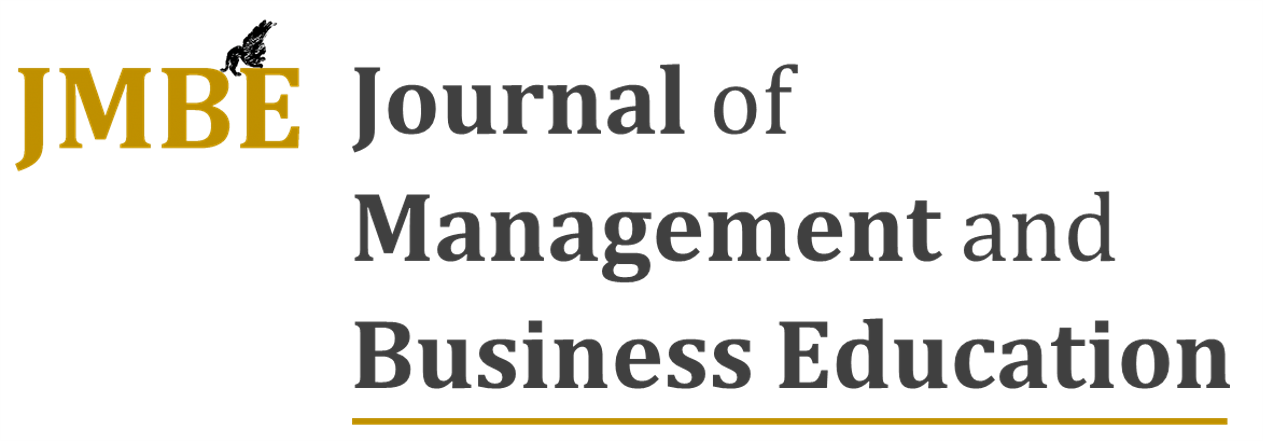Assessment of the implantation of proyect based learning as a tool for the study of business economics
DOI:
https://doi.org/10.35564/jmbe.2018.0014Keywords:
Teaching innovation, Project-Based Learning, collaborative learning, YouTube, teaching videosAbstract
This investigation describes an experience carried out at the students of Business Administration. This experience has consisted of combining Project Based Learning and the use of new Information and Communication Technologies (ICT). The project has consisted of the creation of didactic videos, carried out by students. Videos have basic content on business fundamentals. Our aim has been to motivate students to learn under the multiple possibilities and advantages of ICT and also to encourage them to have autonomous learning for the development of new video creation tools, as well as the use of the YouTube social network. This has been used, in this case, for teaching and learning. A group of students developed resources that have allowed us to improve the learning experience of the rest of the students. We have achieved a more innovative learning for the students and their ability to create short, useful, dynamic and creative videos themselves. In addition, we have also achieved an increased the student motivation. We have also achieved competencies such as: ICT management, organizational and planning skills, information management, decision making, reinforcement of teamwork, collaborative learning, in addition, students obtain specific competences.
Downloads
References
Aguilar-Rivera, M.C. (2010). Estilos y estrategias de aprendizaje en jóvenes ingresantes a la universidad. Revista de Psicología, 28(2), 207-226.
https://doi.org/10.18800/psico.201002.001
Andrade, H.; & Valtcheva, A. (2009). Promoting learning and achievement through self-assessment. Theory Into Practice, 48, 12-19.
https://doi.org/10.1080/00405840802577544
Barca-Enríquez, E.; Vicente-Castro, F.; Almeida, L.; & Barca-Lozano, A. (2014). Impacto de estrategias de aprendizaje, autoeficacia y género en el rendimiento del alumnado de educación secundaria. International Journal of Developmental and Educational Psychology, 2(1), 287-298.
https://doi.org/10.17060/ijodaep.2014.n1.v2.442
Barrio, J.A. del & Nicasio-Gutiérrez, J. (2000). Diferencias en el estilo de aprendizaje. Psicothema, 12(2), 180-186.
Bigné, E., Badenes, A., Ruiz, C., & Andreu, L. (2018). Virtual classroom: teacher skills to promote student engagement. Journal of Management and Business Education, 1(2), 87-105.
https://doi.org/10.35564/jmbe.2018.0008
Calero, J.; Choi, A.; & Waisgrais, S. (2009). Determinantes del rendimiento educativo del alumnado de origen nacional e inmigrante en PISA-2006. Cuadernos Económicos de ICE, 78, 281-310.
https://doi.org/10.32796/cice.2009.78.5977
Chiswick, B.R.; & Miller, P.W. (2003). The complementarity of language and other human capital: Immigrant earnings in Canada. Economics of Educational Review, 22(5), 469-480.
https://doi.org/10.1016/S0272-7757(03)00037-2
Delgado-García, A.M.; & Oliver-Cuello, R. (2009). Interacción entre la evaluación continua y la autoevaluación formativa: La potenciación del aprendizaje autónomo. Revista de Docencia Universitaria, 4, 1-13.
https://doi.org/10.4995/redu.2009.6234
Dorsey, O.L.; & Pierson, M.S.A. (1984). A descriptive study of adult learning styles in a Nontraditional education program. Lifelong Learning, 7(8), 8-11.
García-Beltrán, A.; Martínez, R.; Jaén, J.A.; & Tapia, S. (2016). La autoevaluación como actividad docente en entornos virtuales de aprendizaje/enseñanza. Revista de Educación a Distancia, 50, artículo 14, 1-11.
https://doi.org/10.6018/red/50/14
Glick, P.; & Sahn, D.E. (2010). Early academic performance, grade repetition, and school attainment in Senegal: A panel data analysis. The World Bank Economic Review, 24(1), 93-120.
https://doi.org/10.1093/wber/lhp023
Informe Ditrendia (2017). Informe mobile en España y en el mundo 2017. Available at: http://www.amic.media/media/files/file_352_1289.pdf
Irimia-Diéguez, A.I.; Di Pietro, F.; Vega-Pascual, M.; & Blanco-Oliver, A.J. (2014). El uso de las redes sociales en el marco del Espacio Europeo de Educación Superior. Educade. Revista de Educación en Contabilidad, Finanzas y Administración de Empresas, 5, 49-64.
https://doi.org/10.12795/EDUCADE.2014.i05.05
Jones-White, D.R.; Radcliffe, P.M.; Huesman, R.L.; & Kellogg, J.P. (2010). Redefining student success: Applying different multinominal regression techniques for the study of student graduation across institutions of higher education. Research in Higher Education, 51(2), 154-174.
https://doi.org/10.1007/s11162-009-9149-4
Kherfi, S. (2008). Economic education in the Middle East: Are the determinants of success in introductory economics any different? The Journal of Economic Education, 39(1), 22-40.
https://doi.org/10.3200/JECE.39.1.22-40
López-Pastor, V.M.; González-Pascual, M.; & Barba-Martín, J.J. (2006). ¿Debe el alumnado participar en la evaluación? Propuestas y experiencias en Primaria y Secundaria. Available at: http://www.concejoeducativo.org/2006/debe-el-alumnado-participar-en-la-evaluacion-propuestas-y-experiencias-en-primaria-y-secundaria/
López-Pérez, M.V.; Pérez-López, M.C.; & Rodríguez-Ariza, L. (2011). Blended learning in higher education: Students' perceptions and their relation to outcomes. Computers & Education, 56(1), 818-826.
https://doi.org/10.1016/j.compedu.2010.10.023
Marcenaro-Gutiérrez, O. D., and Navarro-Gómez, M. L. (2007). El éxito en la universidad: Una aproximación cuantílica. Revista de Economía Aplicada, 15(44), 5-39.
Martí, C. (2012). ¿Existen diferencias en el proceso de aprendizaje en función del género del estudiante? Available at: http://2012.economicsofeducation.com/user/pdfsesiones/123.pdf
Martín-García, A.V.; & Rodríguez-Conde, M.J. (2003). Estilos de aprendizaje y grupos de edad: Comparación de dos muestras de estudiantes jóvenes y mayores. Aula Abierta, 82, 97-116.
Padilla-Muñoz, E.M. (2002). Expectativas sobre la eficacia del role-playing como estrategia de enseñanza-aprendizaje y su influencia en el rendimiento académico. Revista de Enseñanza Universitaria, 19, 149-163.
Ríos-Muñoz, D.; & Troncoso, P. (2003). Autoevaluación de los alumnos: Una estrategia participativa orientada al "aprender a valorar". Revista de Estudios y Experiencias en Educación, 2(4), 111-120.
Sánchez-Marín, G.; Lucas-Pérez, M.E.; Carrasco-Hernández, A.J.; Lozano-Reina, G.; & Nicolás-Martínez, C. (2018). The influence of self-assessment activities on student learning outcomes. Journal of Management and Business Education, 1(1), 28-38.
https://doi.org/10.35564/jmbe.2018.0003
Sharma, R.; Jain, A.; Gupta, N.; Garg, S.; Batta, M.; & Dhir, S.K. (2016). Impact of self-assessment by students on their learning. International Journal of Applied Basic Medical Research, 6(3), 226-229.
https://doi.org/10.4103/2229-516X.186961
Sung, Y.T.; Chang, K.E.; Chiou, S.K.; & Hou, H.T. (2005). The design and application of a web-based self- and peer-assessment system. Computers & Education, 45, 187-202.
https://doi.org/10.1016/j.compedu.2004.07.002
Valentín, A.; Mateos, P.M.; González-Tablas, M.M.; Pérez, L.; López, E.; & García, I. (2013). Motivation and learning strategies in the use of ICTs among university students. Computers & Education, 61, 52-58.
Downloads
Published
How to Cite
Issue
Section
License
Copyright (c) 2023 Journal of Management and Business Education

This work is licensed under a Creative Commons Attribution-NonCommercial-ShareAlike 4.0 International License.
License terms at: https://creativecommons.org/licenses/by-nc/4.0/legalcode




